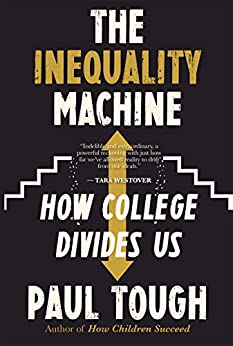More on this book
Community
Kindle Notes & Highlights
During this same period in late 2016, Coleman had been having regular conversations with Jim Shelton, the former deputy secretary of education under President Obama. Shelton had just been hired by Mark Zuckerberg, the CEO of Facebook, and his wife, Priscilla Chan, to oversee education giving for the Chan Zuckerberg Initiative, or CZI, the philanthropic organization the couple had founded a year earlier as a vehicle to give away, in a strategic fashion, the bulk of their $60 billion fortune. Zuckerberg and Chan are proponents of what they call personalized learning—using adaptive technologies
...more
Auguste, it seemed, knew everybody. He was a Yale graduate with a PhD in economics from Oxford. He had worked for twenty years at McKinsey & Company, the consulting firm, rising to become its first African American senior partner.
Ben had taken the PSAT back in the fall of his junior year. He did very well on the verbal side—720 out of 800, putting him in the top few percent nationally—but his math score was less impressive: a 580, which put him only in the top third of all students. Not exactly Yale material. Like millions of other students who had taken the PSAT that year, Ben got an email from the College Board inviting him to study for the SAT using Official SAT Practice on Khan Academy.
As his senior year began, Ben, who in every other way was a fairly typical working-class or middle-class kid, suddenly found himself with a powerful mentor in his corner as well as free help from perhaps the best college-admissions coach and the best test-prep tutor in the DC area.
But Ned’s tutoring also carried with it his underlying, and somewhat subversive, psychological message: that the SAT is not designed to measure your math ability. It is designed to measure your ability to take the SAT.
Ned would prefer to live in a world in which a subpar SAT score wouldn’t keep Ben out of Yale—even if it meant that Ned and test-prep professionals like him would have to find another way to make a living.
A few weeks later, Ben Dormus received his new SAT scores from the College Board. His math score—which went down, remember, when he studied with Khan Academy—had, with Ned’s help, gone up by 110 points, from 560 (out of 800) to 670. That catapulted Ben from about the sixty-fifth percentile nationally to the ninetieth percentile. And that did the trick. The following month, Yale admitted Ben to its undergraduate class of 2021. He would be attending his dream school. His life had changed.
And those four years had been long enough for them to make friends whose families had ski chalets and beach houses, long enough to take part in the subsidized study-abroad programs that many exclusive private schools offer their students, long enough to infiltrate the culture of the American elite.


